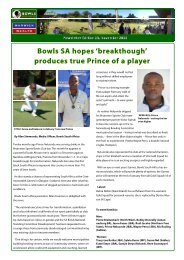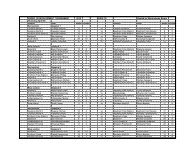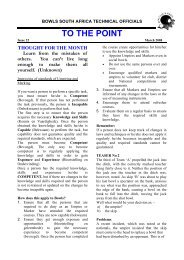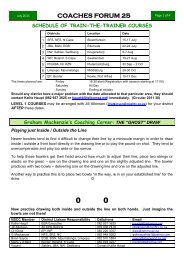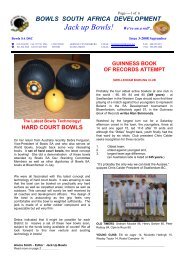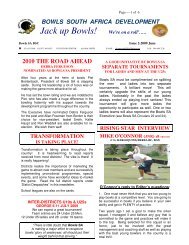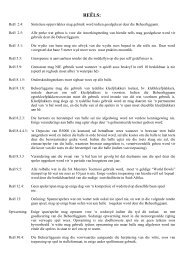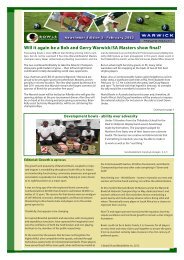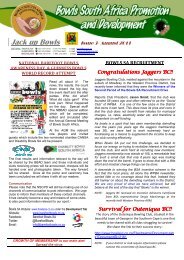Natal, WP grab SA Masters crowns - Bowls South Africa
Natal, WP grab SA Masters crowns - Bowls South Africa
Natal, WP grab SA Masters crowns - Bowls South Africa
You also want an ePaper? Increase the reach of your titles
YUMPU automatically turns print PDFs into web optimized ePapers that Google loves.
(Missing: Con Dixie, Merle van den Berg and Brian<br />
Sayce, three of the presenters and members of the<br />
NSCC)<br />
The course was held at Wingate Park in Pretoria<br />
from the 20 to the 24th of November. Districts<br />
were allowed to nominate two eligible candidates.<br />
From the outset it was planned that the course<br />
would be very practical and interactive with<br />
presentations by NSCC and invited speakers kept<br />
to a minimum. The emphasis was also on having<br />
fun and making coaching fun (which led to some<br />
hilarious moments)!<br />
As most would-be coaches dread giving presentations these were done in three small groups to ensure the presenters felt com-<br />
fortable and at ease. Coaching principles, the Clinic Technique, Lifestyle, Communication, Roles and Responsibilities of coaches,<br />
Teaching and Learning Strategies were all covered. At the beginning of the course candidates were invited to give their expec-<br />
tations of the course which were then listed and marked off on a daily basis. Everything was finally ticked and the candidates<br />
departed with the knowledge required to do their post-course projects which entails the planning, implementation and analysis<br />
of a half-day coaching clinic which has to be completed by the end of February. NSCC plans to offer this course every second year,<br />
i.e. the next one is planned for 2013.<br />
Q What feedback should you give after playing a<br />
good shot?<br />
A Avoid nonverbal gestures of triumph – pride often<br />
comes before a fall, especially in bowls! Smile perhaps if you<br />
really need to give feedback, but be modest. If you lose your<br />
concentration by thinking you are a wonderful player, you<br />
will start playing badly. Aim at playing more good shots to<br />
improve your consistency. Successful players concentrate on<br />
every bowl played.<br />
Q What feedback should be given to a team member’s<br />
good shot?<br />
A A simple “Well done” is usually sufficient. Sometimes<br />
the player might need special encouragement if they have<br />
been struggling but don’t overdo it – as this could border on<br />
gamesmanship.<br />
Q What feedback should be given when the opposition<br />
plays a good shot?<br />
A To ignore a good bowl is simply bad manners and<br />
poor sportsmanship. Again a quiet word like “Well played” is<br />
sufficient. If your praise is over-exuberant, your fellow team<br />
players could think you think the opposition plays well and you<br />
are playing badly! It is a thin line that bowlers walk!<br />
Q What feedback should be given when the opposition<br />
inadvertently gives you a shot by promoting one of<br />
your team’s bowls?<br />
A This has happened to all of us occasionally but it is<br />
extremely poor sportsmanship to thank them! “Bad luck” is<br />
The 2011 Level 2 (District) Coaches Course<br />
GET YOUR FEEDBACK RIGHT…<br />
Some aspects of Feedback Theory as applied to the playing of bowls<br />
(The second and final part of the article, the first part of which appeared in Forum 26)<br />
Merle van den Berg<br />
(An updated article of one which appeared in <strong>Bowls</strong> Action: Volume 2 Number 1, Jan/Feb 1999)<br />
sufficient.<br />
Q What should you do when you have not heard an<br />
instruction, a question or feedback?<br />
A Check by asking immediately that the communication<br />
is repeated to avoid misunderstandings. If you don’t it<br />
could cost your team the game. In an important game a skip<br />
shouldn’t rely on unclear feedback but should inspect the<br />
head. It is vital that team members do not misunderstand<br />
each other. (The distance between the player and the skip can<br />
be problematical.) Rather than be irritated by the query, the<br />
person should repeat and even rephrase the message.<br />
Q Is it as easy to give and receive feedback in the<br />
bowling situation, as in other everyday situations?<br />
A No, the greater the distance between the individuals<br />
concerned, the more difficult it is to give and receive accurate<br />
feedback. It is so much easier to communicate, to observe<br />
and even to check intentions and meaning when you are face<br />
to face. In the bowling situation the immediacy is greatly<br />
restricted, particularly between the skip and front rank. In trips<br />
and pairs it is only when the players swap ends that they have<br />
a brief moment for an interchange. This highlights the necessity<br />
of a supportive relationship between the two members of<br />
the front rank. The same applies to the third and the skip. This<br />
restriction also means that feedback tends to be more nonverbal<br />
than verbal and thus the importance of the (agreed) sign<br />
language to avoid unnecessary shouting and the divulgence of<br />
tactics.



